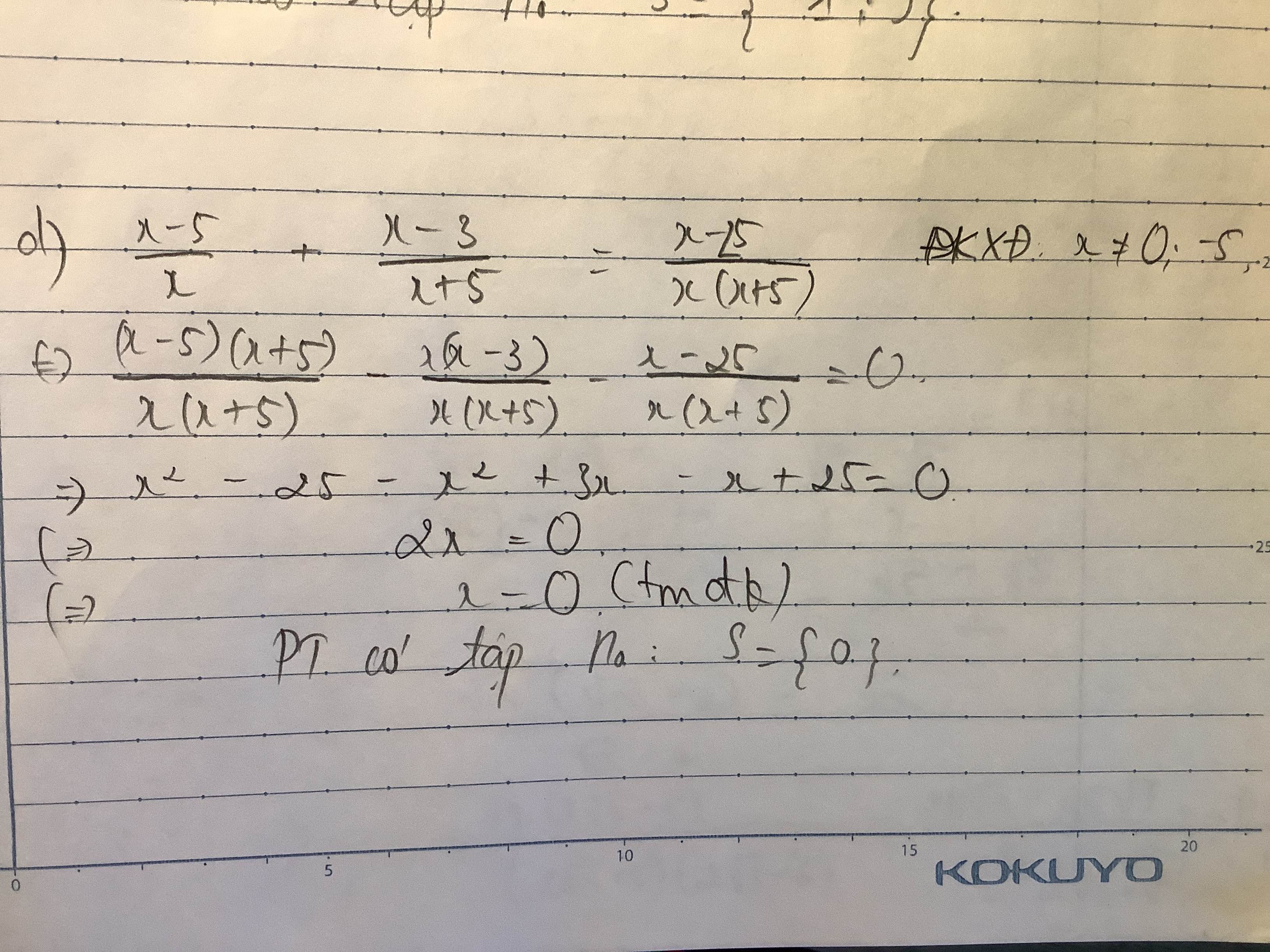Giải phương trình sau: (x-1)(x+5)/3 - (x+2)(x+5)/12 = (x-1)(x+2)/4

Những câu hỏi liên quan
1) Giải các phương trình sau : a) x-3/x=2-x-3/x+3 b) 3x^2-2x-16=0 2) Giải bất phương trình sau: 4x-3/4>3x-5/3-2x-7/12
\(a,\dfrac{x-3}{x}=\dfrac{x-3}{x+3}\)\(\left(đk:x\ne0,-3\right)\)
\(\Leftrightarrow\dfrac{x-3}{x}-\dfrac{x-3}{x+3}=0\)
\(\Leftrightarrow\dfrac{\left(x-3\right)\left(x+3\right)-x\left(x-3\right)}{x\left(x+3\right)}=0\)
\(\Leftrightarrow x^2-9-x^2+3x=0\)
\(\Leftrightarrow3x-9=0\)
\(\Leftrightarrow3x=9\)
\(\Leftrightarrow x=3\left(n\right)\)
Vậy \(S=\left\{3\right\}\)
Đúng 1
Bình luận (0)
\(b,\dfrac{4x-3}{4}>\dfrac{3x-5}{3}-\dfrac{2x-7}{12}\)
\(\Leftrightarrow\dfrac{4x-3}{4}-\dfrac{3x-5}{3}+\dfrac{2x-7}{12}>0\)
\(\Leftrightarrow\dfrac{3\left(4x-3\right)-4\left(3x-5\right)+2x-7}{12}>0\)
\(\Leftrightarrow12x-9-12x+20+2x-7>0\)
\(\Leftrightarrow2x+4>0\)
\(\Leftrightarrow2x>-4\)
\(\Leftrightarrow x>-2\)
Đúng 1
Bình luận (0)
giải các phương trình sau
1/ 7x-5=13-5x
2/ 19+3x=5-18x
3/ x^2+2x-4=-12+3x+x^2
4/ -(x+5)=3(x-5)
5/ 3(x+4)=(-x+4)
1/ \(7x-5=13-5x\)
\(\Leftrightarrow12x=18\)
\(\Leftrightarrow x=\dfrac{3}{2}\)
Vậy: \(S=\left\{\dfrac{3}{2}\right\}\)
==========
2/ \(19+3x=5-18x\)
\(\Leftrightarrow21x=-14\)
\(\Leftrightarrow x=-\dfrac{2}{3}\)
Vậy: \(S=\left\{-\dfrac{2}{3}\right\}\)
==========
3/ \(x^2+2x-4=-12+3x+x^2\)
\(\Leftrightarrow-x=-8\)
\(\Leftrightarrow x=8\)
Vậy: \(S=\left\{8\right\}\)
===========
4/ \(-\left(x+5\right)=3\left(x-5\right)\)
\(\Leftrightarrow-x-5=3x-15\)
\(\Leftrightarrow-4x=-10\)
\(\Leftrightarrow x=\dfrac{5}{2}\)
Vậy: \(S=\left\{\dfrac{5}{2}\right\}\)
==========
5/ \(3\left(x+4\right)=\left(-x+4\right)\)
\(\Leftrightarrow3x+12=-x+4\)
\(\Leftrightarrow4x=-8\)
\(\Leftrightarrow x=-2\)
Vậy: \(S=\left\{-2\right\}\)
[----------]
Đúng 1
Bình luận (0)
1. \(7x-5=13-5x\) \(\Leftrightarrow12x=18\Leftrightarrow x=\dfrac{3}{2}\)
2. \(19+3x=5-18x\Leftrightarrow21x=-14\Leftrightarrow x=-\dfrac{2}{3}\)
3. \(x^2+2x-4=-12+3x+x^2\Leftrightarrow-x=-8\Leftrightarrow x=8\)
4. \(-\left(x+5\right)=3\left(x-5\right)\Leftrightarrow-x-5=3x-15\Leftrightarrow4x=10\Leftrightarrow x=\dfrac{5}{2}\)
5. \(3\left(x+4\right)=-x+4\Leftrightarrow3x+12=-x+4\Leftrightarrow4x=-8\Leftrightarrow x=-2\)
Đúng 1
Bình luận (0)
1) Ta có: \(7x-5=13-5x\)
\(\Leftrightarrow12x=18\)
hay \(x=\dfrac{3}{2}\)
2) Ta có: \(19+3x=5-18x\)
\(\Leftrightarrow21x=-14\)
hay \(x=-\dfrac{2}{3}\)
3) Ta có: \(x^2+2x-4=x^2+3x-12\)
\(\Leftrightarrow3x-12=2x-4\)
hay x=8
4) Ta có: \(-\left(x+5\right)=3\left(x-5\right)\)
\(\Leftrightarrow-x-5-3x+15=0\)
\(\Leftrightarrow-4x=-10\)
hay \(x=\dfrac{5}{2}\)
Đúng 0
Bình luận (0)
giải các phương trình sau
1, \(\dfrac{5x^2-12}{x^2-1}+\dfrac{3}{x-1}=\dfrac{5x}{x+1}\)
2, \(\dfrac{3}{x-5}-\dfrac{15-3x}{x^2-25}=\dfrac{3}{x+5}\)
3, \(\dfrac{-3}{x-4}-\dfrac{3-5x}{x^2-16}=\dfrac{1}{x+4}\)
1: Ta có: \(\dfrac{5x^2-12}{x^2-1}+\dfrac{3}{x-1}=\dfrac{5x}{x+1}\)
\(\Leftrightarrow\dfrac{5x^2-12}{\left(x-1\right)\left(x+1\right)}+\dfrac{3x+3}{\left(x-1\right)\left(x+1\right)}=\dfrac{5x^2-5x}{\left(x+1\right)\left(x-1\right)}\)
Suy ra: \(5x^2+3x-9=5x^2-5x\)
\(\Leftrightarrow8x=9\)
hay \(x=\dfrac{9}{8}\left(tm\right)\)
2: Ta có: \(\dfrac{3}{x-5}-\dfrac{15-3x}{x^2-25}=\dfrac{3}{x+5}\)
\(\Leftrightarrow\dfrac{3x+15}{\left(x-5\right)\left(x+5\right)}+\dfrac{3x-15}{\left(x-5\right)\left(x+5\right)}=\dfrac{3x-15}{\left(x+5\right)\left(x-5\right)}\)
Suy ra: \(6x=3x-15\)
\(\Leftrightarrow3x=-15\)
hay \(x=-5\left(loại\right)\)
Đúng 1
Bình luận (0)
2. ĐKXĐ: $x\neq \pm 5$
PT \(\Leftrightarrow \frac{3}{x-5}+\frac{3x-15}{x^2-25}=\frac{3}{x+5}\)
\(\Leftrightarrow \frac{3}{x-5}+\frac{3(x-5)}{(x-5)(x+5)}=\frac{3}{x+5}\)
\(\Leftrightarrow \frac{3}{x-5}+\frac{3}{x+5}=\frac{3}{x+5}\Leftrightarrow \frac{3}{x-5}=0\) (vô lý)
Vậy pt vô nghiệm.
Đúng 0
Bình luận (0)
3. ĐKXĐ: $x\neq \pm 4$
PT \(\Leftrightarrow \frac{-3(x+4)}{(x-4)(x+4)}-\frac{3-5x}{(x-4)(x+4)}=\frac{x-4}{(x-4)(x+4)}\)
\(\Rightarrow -3(x+4)-(3-5x)=x-4\)
\(\Leftrightarrow 2x-15=x-4\Leftrightarrow x=11\) (thỏa mãn)
Đúng 0
Bình luận (0)
Giải các phương trình sau
1,x-x+1/3=2x+1/5
2,7-3x/12+3/4=2(x-2)+5(5-2x)/6
Giải Phương trình sau:
a:(x+1)/4-(x+2)/5+(x+4)/7-(x+5)/8+(x+7)/10-(x+9)/12=0
b:x/2004+(x+1)/2005+(x+2)/2006+(x+3)/2007=4
a) \(\frac{x+1}{4}-\frac{x+2}{5}+\frac{x+4}{7}-\frac{x+5}{8}+\frac{x+7}{10}-\frac{x+9}{12}=0\)
\(\Leftrightarrow\)\(\frac{x+1}{4}-1-\frac{x+2}{5}+1+\frac{x+4}{7}-1-\frac{x+5}{8}+1+\frac{x+7}{10}-1-\frac{x+9}{12}+1=0\)
\(\Leftrightarrow\)\(\frac{x-3}{4}-\frac{3-x}{5}+\frac{x-3}{7}-\frac{3-x}{8}+\frac{x+3}{10}-\frac{3-x}{12}=0\)
\(\Leftrightarrow\)\(\frac{x-3}{4}+\frac{x-3}{5}+\frac{x-3}{7}+\frac{x-3}{8}+\frac{x-3}{10}+\frac{x-3}{12}=0\)
\(\Leftrightarrow\)\(\left(x-3\right)\left(\frac{1}{4}+\frac{1}{5}+\frac{1}{7}+\frac{1}{8}+\frac{1}{10}+\frac{1}{12}\right)=0\)
Vì \(\frac{1}{4}+\frac{1}{5}+\frac{1}{7}+\frac{1}{8}+\frac{1}{10}+\frac{1}{12}\ne0\)
\(\Rightarrow\)\(x-3=0\)
\(\Leftrightarrow\)\(x=3\)
Vậy...
b) \(\frac{x}{2004}+\frac{x+1}{2005}+\frac{x+2}{2006}+\frac{x+3}{2007}=4\)
\(\Leftrightarrow\)\(\frac{x}{2004}-1+\frac{x+1}{2005}-1+\frac{x+2}{2006}-1+\frac{x+3}{2007}-1=0\)
\(\Leftrightarrow\)\(\frac{x-2004}{2004}+\frac{x-2004}{2005}+\frac{x-2004}{2006}+\frac{x-2004}{2007}=0\)
\(\Leftrightarrow\)\(\left(x-2004\right)\left(\frac{1}{2004}+\frac{1}{2005}+\frac{1}{2006}+\frac{1}{2007}\right)=0\)
Vì \(\frac{1}{2004}+\frac{1}{2005}+\frac{1}{2006}+\frac{1}{2007}\ne0\)
\(\Rightarrow\)\(x-2004=0\)
\(\Leftrightarrow\)\(x=2004\)
Vậy...
Đúng 0
Bình luận (0)
giải các phương trình sau
a, 4x- 2(1-x)= 5(x-4)
b, \(\dfrac{x}{6}+\dfrac{1-3x}{9}=\dfrac{-x+1}{12}\)
c, \(\left(x+2\right)^2-3\left(x+2\right)=0\)
d,\(\dfrac{x-5}{x}+\dfrac{x-3}{x+5}=\dfrac{x-25}{x\left(x+5\right)}\)
a: Ta có: \(4x-2\left(1-x\right)=5\left(x-4\right)\)
\(\Leftrightarrow4x-2+2x=5x-20\)
\(\Leftrightarrow x=-18\)
b: Ta có: \(\dfrac{x}{6}+\dfrac{1-3x}{9}=\dfrac{-x+1}{12}\)
\(\Leftrightarrow6x+4\left(1-3x\right)=3\left(-x+1\right)\)
\(\Leftrightarrow6x+4-12x=-3x+3\)
\(\Leftrightarrow-3x=-1\)
hay \(x=\dfrac{1}{3}\)
c: Ta có: \(\left(x+2\right)^2-3\left(x+2\right)=0\)
\(\Leftrightarrow\left(x+2\right)\left(x-1\right)=0\)
\(\Leftrightarrow\left[{}\begin{matrix}x=-2\\x=1\end{matrix}\right.\)
Đúng 0
Bình luận (0)
d: Ta có: \(\dfrac{x-5}{x}+\dfrac{x-3}{x+5}=\dfrac{x-25}{x\left(x+5\right)}\)
\(\Leftrightarrow x^2-25+x^2-3x=x-25\)
\(\Leftrightarrow2x^2-4x=0\)
\(\Leftrightarrow2x\left(x-2\right)=0\)
\(\Leftrightarrow\left[{}\begin{matrix}x=0\left(loại\right)\\x=2\left(nhận\right)\end{matrix}\right.\)
Đúng 0
Bình luận (0)
Giải các phương trình sau: (TM ĐK) 1) dfrac{11}{x}dfrac{9}{x+1}+dfrac{2}{x-4} 2) dfrac{14}{3x-12}-dfrac{2+x}{x-4}dfrac{3}{8-2x}-dfrac{5}{6} 3) dfrac{x+5}{x^2-5x}-dfrac{x+25}{2x^2-50}dfrac{x-5}{2x^2+10} 4) dfrac{x+1}{x-1}-dfrac{x-1}{x+1}dfrac{16}{x^2-1} 5) left(1-dfrac{x-1}{x+1}right)left(x+2right)dfrac{x+1}{x-1}+dfrac{x-1}{x+1} mng giúp mk bài này nha. Cảm ơn bạn nhiều
Đọc tiếp
Giải các phương trình sau: (TM ĐK)
1) \(\dfrac{11}{x}=\dfrac{9}{x+1}+\dfrac{2}{x-4}\)
2) \(\dfrac{14}{3x-12}-\dfrac{2+x}{x-4}=\dfrac{3}{8-2x}-\dfrac{5}{6}\)
3) \(\dfrac{x+5}{x^2-5x}-\dfrac{x+25}{2x^2-50}=\dfrac{x-5}{2x^2+10}\)
4) \(\dfrac{x+1}{x-1}-\dfrac{x-1}{x+1}=\dfrac{16}{x^2-1}\)
5) \(\left(1-\dfrac{x-1}{x+1}\right)\left(x+2\right)=\dfrac{x+1}{x-1}+\dfrac{x-1}{x+1}\)
mng giúp mk bài này nha. Cảm ơn bạn nhiều
\(1,\left(dk:x\ne0,-1,4\right)\)
\(\Leftrightarrow\dfrac{9}{x+1}+\dfrac{2}{x-4}-\dfrac{11}{x}=0\)
\(\Leftrightarrow\dfrac{9x\left(x-4\right)+2x\left(x+1\right)-11\left(x+1\right)\left(x-4\right)}{x\left(x+1\right)\left(x-4\right)}=0\)
\(\Leftrightarrow9x^2-36x+2x^2+2x-11x^2+44x-11x+44=0\)
\(\Leftrightarrow-x=-44\)
\(\Leftrightarrow x=44\left(tm\right)\)
\(2,\left(đk:x\ne4\right)\)
\(\Leftrightarrow\dfrac{14}{3\left(x-4\right)}-\dfrac{2+x}{x-4}-\dfrac{3}{2\left(x-4\right)}+\dfrac{5}{6}=0\)
\(\Leftrightarrow\dfrac{14.2-6\left(2+x\right)-3.3+5\left(x-4\right)}{6\left(x-4\right)}=0\)
\(\Leftrightarrow28-12-6x-9+5x-20=0\)
\(\Leftrightarrow-x=13\)
\(\Leftrightarrow x=-13\left(tm\right)\)
Đúng 2
Bình luận (2)
Giải các phương trình sau:
\(a.\dfrac{4x-5}{x-1}=2+\dfrac{x}{x-1}\)
\(b.\dfrac{7}{x+2}=\dfrac{3}{x-5}\)
\(c.\dfrac{14}{3x-12}-\dfrac{2+x}{x-4}=\dfrac{3}{8-2x}-\dfrac{5}{6}\)
\(d.\dfrac{x+1}{x-1}-\dfrac{x-1}{x+1}=\dfrac{16}{x^2-1}\)
TK
https://lazi.vn/edu/exercise/giai-phuong-trinh-4x-5-x-1-2-x-x-1-7-x-2-3-x-5
Đúng 2
Bình luận (0)
a: \(\Leftrightarrow4x-5=2x-2+x\)
=>4x-5=3x-2
=>x=3(nhận)
b: =>7x-35=3x+6
=>4x=41
hay x=41/4(nhận)
c: \(\Leftrightarrow\dfrac{14}{3\left(x-4\right)}-\dfrac{x+2}{x-4}=\dfrac{-3}{2\left(x-4\right)}-\dfrac{5}{6}\)
\(\Leftrightarrow\dfrac{28}{6\left(x-4\right)}-\dfrac{6\left(x+2\right)}{6\left(x-4\right)}=\dfrac{-9}{6\left(x-4\right)}-\dfrac{5\left(x-4\right)}{6\left(x-4\right)}\)
\(\Leftrightarrow28-6x-12=-9-5x+20\)
=>-6x+16=-5x+11
=>-x=-5
hay x=5(nhận)
d: \(\Leftrightarrow x^2+2x+1-\left(x^2-2x+1\right)=16\)
\(\Leftrightarrow4x=16\)
hay x=4(nhận)
Đúng 0
Bình luận (0)
giải phương trình sau: a) (x2 + x)2 + 4(x2 + x) 12;b) x(x-1)(x + 1)(x+2) 24;c) (x-7)(x-5)(x-4)(x-2) 72.
Đọc tiếp
giải phương trình sau:
a) (x2 + x)2 + 4(x2 + x) = 12;
b) x(x-1)(x + 1)(x+2)= 24;
c) (x-7)(x-5)(x-4)(x-2)= 72.
1. Đặt $x^2+x=a$ thì pt trở thành:
$a^2+4a=12$
$\Leftrightarrow a^2+4a-12=0$
$\Leftrightarrow (a-2)(a+6)=0$
$\Leftrightarrow a-2=0$ hoặc $x+6=0$
$\Leftrightarrow x^2+x-2=0$ hoặc $x^2+x+6=0$
Dễ thấy $x^2+x+6=0$ vô nghiệm.
$\Rightarrow x^2+x-2=0$
$\Leftrightarrow (x-1)(x+2)=0$
$\Leftrightarrow x=1$ hoặc $x=-2$
Đúng 1
Bình luận (0)
2.
$x(x-1)(x+1)(x+2)=24$
$\Leftrightarrow [x(x+1)][(x-1)(x+2)]=24$
$\Leftrightarrow (x^2+x)(x^2+x-2)=24$
$\Leftrightarrow a(a-2)=24$ (đặt $x^2+x=a$)
$\Leftrightarrow a^2-2a-24=0$
$\Leftrightarrow (a+4)(a-6)=0$
$\Leftrightarrow a+4=0$ hoặc $a-6=0$
$\Leftrightarrow x^2+x+4=0$ hoặc $x^2+x-6=0$
Nếu $x^2+x+4=0$
$\Leftrightarrow (x+\frac{1}{2})^2=\frac{1}{4}-4<0$ (vô lý - loại)
Nếu $x^2+x-6=0$
$\Leftrightarrow (x-2)(x+3)=0$
$\Leftrightarrow x-2=0$ hoặc $x+3=0$
$\Leftrightarrow x=2$ hoặc $x=-3$
Đúng 0
Bình luận (0)
3.
$(x-7)(x-5)(x-4)(x-2)=72$
$\Leftrightarrow [(x-7)(x-2)][(x-5)(x-4)]=72$
$\Leftrightarrow (x^2-9x+14)(x^2-9x+20)=72$
$\Leftrightarrow a(a+6)=72$ (đặt $x^2-9x+14=a$)
$\Leftrightarrow a^2+6a-72=0$
$\Leftrightarrow (a-6)(a+12)=0$
$\Leftrightarrow a-6=0$ hoặc $a+12=0$
$\Leftrightarrow x^2-9x+8=0$ hoặc $x^2-9x+26=0$
$\Leftrightarrow x^2-9x+8=0$ (dễ thấy pt $x^2-9x+26=0$ vô nghiệm)
$\Leftrightarrow (x-1)(x-8)=0$
$\Leftrightarrow x-1=0$ hoặc $x-8=0$
$\Leftrightarrow x=1$ hoặc $x=8$
Đúng 0
Bình luận (0)
Bài 1:giải các phương trình sau
a)2x-10=0 b)3,4-x=-4 c)x-4/5=1/5 d)x+12=2-x e)2(x-3)-3x+5=0
a) \(2x-10=0\)
\(\Leftrightarrow2x=10\)
\(\Leftrightarrow x=5\)
Vậy tập nghiệm của phương trình là: S = {5}
b) \(3,4-x=-4\)
\(\Leftrightarrow x=7,4\)
Vậy tập nghiệm của phương trình là: S = {7,4}
c) \(x-\frac{4}{5}=\frac{1}{5}\)
\(\Leftrightarrow x=1\)
Vậy tập nghiệm của phương trình là: S = {1}
d) \(2\left(x-3\right)-3x+5=0\)
\(\Leftrightarrow2x-6-3x+5=0\)
\(\Leftrightarrow-x-1=0\)
\(\Leftrightarrow x=-1\)
Vậy tập nghiệm của phương trình là: S = {-1}
a, \(2x-10=0\Leftrightarrow x=5\)
Vậy tập nghiệm của phương trình là S = {5}
b, \(3,4-x=-4\Leftrightarrow x=7,4\)kết luận tương tự như trên và các phần còn lại
c, \(\frac{x-4}{5}=\frac{1}{5}\)Khử mẫu : \(x-4=1\Leftrightarrow x=5\)
d, \(x+12=2-x\Leftrightarrow2x=-10\Leftrightarrow x=-5\)
e, \(2\left(x-3\right)-3x+5=0\Leftrightarrow2x-6-3x+5=0\)
\(\Leftrightarrow-x-1=0\Leftrightarrow x=-1\)


























